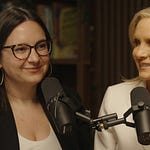Colin Campbell says that the way our society treats grief—and people in grief—is cruel and backward, and it needs a radical reimagining.
He, of all people, would know.
Four years ago, Colin, his wife Gail, and their two teenage kids were driving to Joshua Tree, when they were T-boned by a drunk and high driver going 90 miles an hour. Colin and Gail survived. Their two children, Ruby and Hart, did not.
How do you live after that nightmare? How do you support a friend, a colleague, a brother or sister, who literally does not know how to go on?
Colin’s new book, Finding the Words, attempts to answer those unimaginable questions. It tells the story not only of his own pain in the weeks and months following Ruby and Hart’s death, but also breaks down our society’s misconceptions about grief, which he calls the “grief orthodoxy,” and it provides practical advice for a different kind of approach to grief—one that is more truthful, real, and connected.
People say to the grieving “There are no words” because they’re scared to confront the hard conversation. As Colin writes, it “acts as a perfect conversation killer. This empty phrase immediately ends any chance of a dialogue about loss and mourning. It encapsulates all that is wrong with how our society handles grief.”
Learn more about your ad choices. Visit megaphone.fm/adchoices
















I am grateful for this topic. I especially liked hearing how the Jewish faith formalizes the practice of grief and letting go. I am using this podcast with my seniors as we explore John Donne's "Meditation 17" and "Death Be Not Proud" this week. Thank you for inviting Colin on the show, Bari. Especially now with the absolute tragedy in Israel. My heart just breaks for the Jewish people.
This was one of the better episodes of Honestly. I appreciated this interview and discussion and am going to buy Colin's book on Audible. I so understand the pain of grief and still feel the pain of losing my 13-year-old brother, 7 months of after his bar mitzvah, 41 years ago, after a car that my dad was driving was side-swiped by a young woman going through a red light, a half mile from my dad's home. The pain and grief for my parents as well as my sister and I were powerful and devastating and took many years to slightly subside. My dad also had incredible guilt, even though it wasn't his fault and it was just a random accident. I believe like Colin that this wasn't "meant to be" or God's plan, as some say. It was a freakish accident. Thanks again for this powerful, heartfelt, and insightful interview. It is comforting when others share their stories in this wide community of grief and loss.